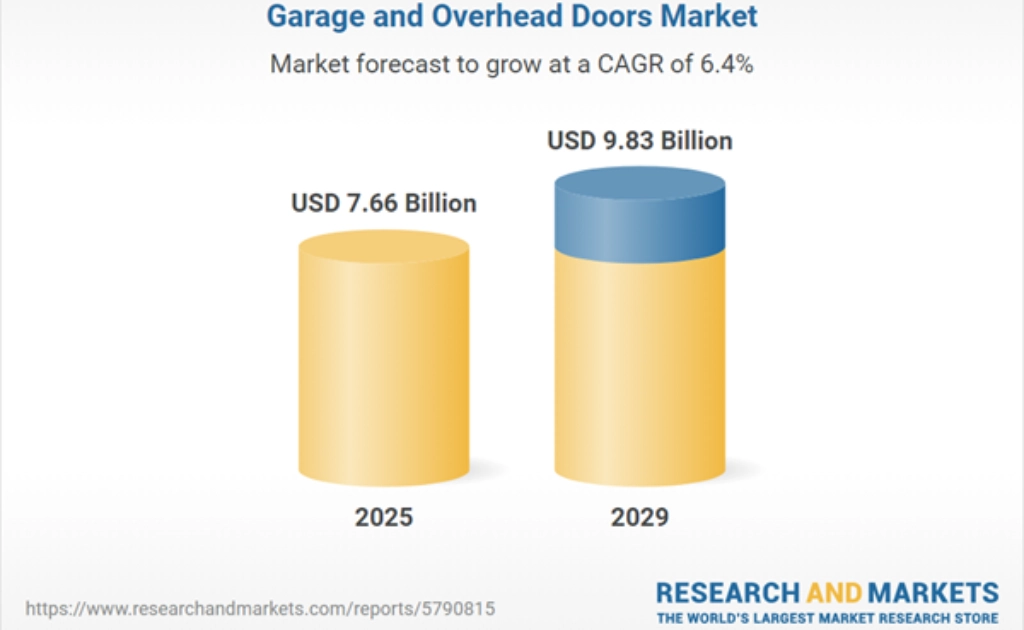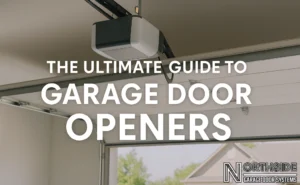In terms of Insulated vs Non-Insulated Garage Doors, Your garage is for far more than just your car, many other items and valuables could be stored there, and its important you keep them safe and secure.
A 2024 statistic shows that the size of the garage and overhead door market has grown strongly in recent years. In 2024, its market value was $7.27 billion and in 2025, it will grow at a CAGR of 5.4% to reach $7.66 billion.

In addition to this, while you’re probably thinking about theft, consider the risk of the natural elements as well. An insulated garage door can help combat temperature in a way that keeps everything in your garage safer. But is it worth the investment? Let’s find out.
Types of Insulation
There are a variety of types of insulation, which gives you some options if you decide that an insulated garage door is right for you. The type plays a role in the garage door insulation cost and effectiveness of the insulation. Here are the most common insulation types:
- Polystyrene – Most common and budget-friendly
- Polyurethane – Offers the highest R-value (thermal resistance)
- Vinyl backing – The lowest R-value, but lightweight
There are other insulation types as well such as after-market foam insulation kits, however, those are generally not recommended as it alter the weight of the door. There are several things to keep in mind as you consider insulated vs non-insulated garage doors to decide which is best for you. The temperature where you live, your budget, your commitment to eco-friendly and recycled materials, and the availability of materials are some examples.
Understanding R-Value in Garage Doors
If you’re considering an insulated garage door vs non-insulated, one of the most important technical factors to understand is the R-value. The R-Value is used to evaluate the performance of an insulated garage door but about different aspects of the insulation used. R-value refers to the thermal resistance of the insulation material. In other words, how effective is the material at resisting the transfer of heat? This is important to know, as a higher R-value means better insulation when it comes to outdoor temperatures. This is helpful for a garage that is connected to your house or a garage that you use as a workshop or some type of living space.
Advantages of Insulated Garage Doors
Insulated garage doors have several benefits that you can take advantage of when you choose them for your space. Knowing what the advantages help you balance them with the potential downfalls, making it easier to choose the right option for your needs. Have a look at the benefits below:
- Improved energy efficiency (lower heating/cooling bills)
- Enhanced temperature control year-round
- Noise reduction (great for busy neighborhoods)
- Greater durability and door strenght
- Additional aesthetic options
- Reduced condensation and moisture damage
- Condensation mitigation
- Long-term money savings
- Better resale value for your home
If you’ve ever wondered, “Are insulated garage doors worth it?” — for any homes, the answer is often yes. Overall, insulated garage doors offer comfort, financial relief, and much more to homes that have a garage. Many homeowners will find that they are a good investment.
Disadvantages of Insulated Garage Doors
While insulated garage doors have an impressive list of benefits, there are some drawbacks to keep in mind as well. Again, this allows you to weigh the pros and cons so you can choose the type of garage door that works best for you. Minor disadvantages include the following:
- Higher short-term costs
- Weightier than uninsulated door models
- Questionable return on investment if your garage is rarely used
Your needs and budget should play a big role in whether you choose to insulate your garage doors or not, because the repair cost of insulated garage doors is also higher. With that in mind, let’s have a look at the pros and cons of non-insulated garage doors.

Advantages of Non-insulated Garage Doors
While you won’t get the same thermal regulation benefits that insulated doors offer, there are several perks to choosing a non-insulated door. Find out what they are here:
- Less expensive upfront costs
- Lightweight design (less strain on openers)
- Multiple design options
- Easy to maintain
- Recommended for use in detached garages or non-climate-controlled spaces
If you don’t need to rely on temperature regulation for any reason, you might find that a non-insulated garage door makes more sense for your needs.
Disadvantages of Non-insulated Garage Doors
Much like insulated garage door options, there are some drawbacks associated with those that aren’t insulated. Use these to balance the advantages as you debate the choice of insulated vs non-insulated garage doors. Disadvantages include the following:
- Limited soundproofing
- Poor temperature control
- Far less durability
- Higher risk of condensation buildup
- Reduced energy efficiency
- Less comfort inside the garage
Chances are that if you use your garage for entertaining, engaging in a hobby, or storage of certain items, you will be happier if your door is insulated. On the other hand, if you only use your garage to park your car and your lawnmower, you may not need to add insulation.
How to Decide: Insulated vs Non-Insulated Garage Doors
The answer to this question is likely to differ from person to person. Before you can decide which option is best suited to you, it’s important to consider what you are using your garage for.
Ask yourself these questions:
- Is your garage attached to your home?
- Do you plan to store electronics, tools, or food?
- Do you use your garage as a workshop or gym?
- Are your energy bills too high?
If you answered “yes” to any of the above, you likely do need an insulated garage door.
However, if it’s detached and you don’t use it for anything other than parking your car, the cost might not make sense to you.
Before making your decision, take some time to evaluate the pros and cons listed above. They will offer you helpful clues as to which type of garage door would work best and be most valuable for your space and your living situation. If you’re still unsure, a garage door professional can offer additional insight and help you learn more.

Do You Really Need an Insulated Garage Door?
Some signs will tell you that an insulated garage door is the right choice for you. However, they may not apply to every person and every situation, so be sure you take the time to consider what you need and what your goals are with choosing a garage door. Some instances that indicate that an insulated door is right for you include the following:
- There are temperature extremes, either hot or cold, where you live
- The garage is attached to the living spaces
- Your energy bills are too high
- You have issues with excess moisture and condensation
- Renovating the garage into a living space
- You want to minimize noise transfer
Do your research and do your sums for insulated vs non-insulated garage doors to ensure you make the right choice for your property.







